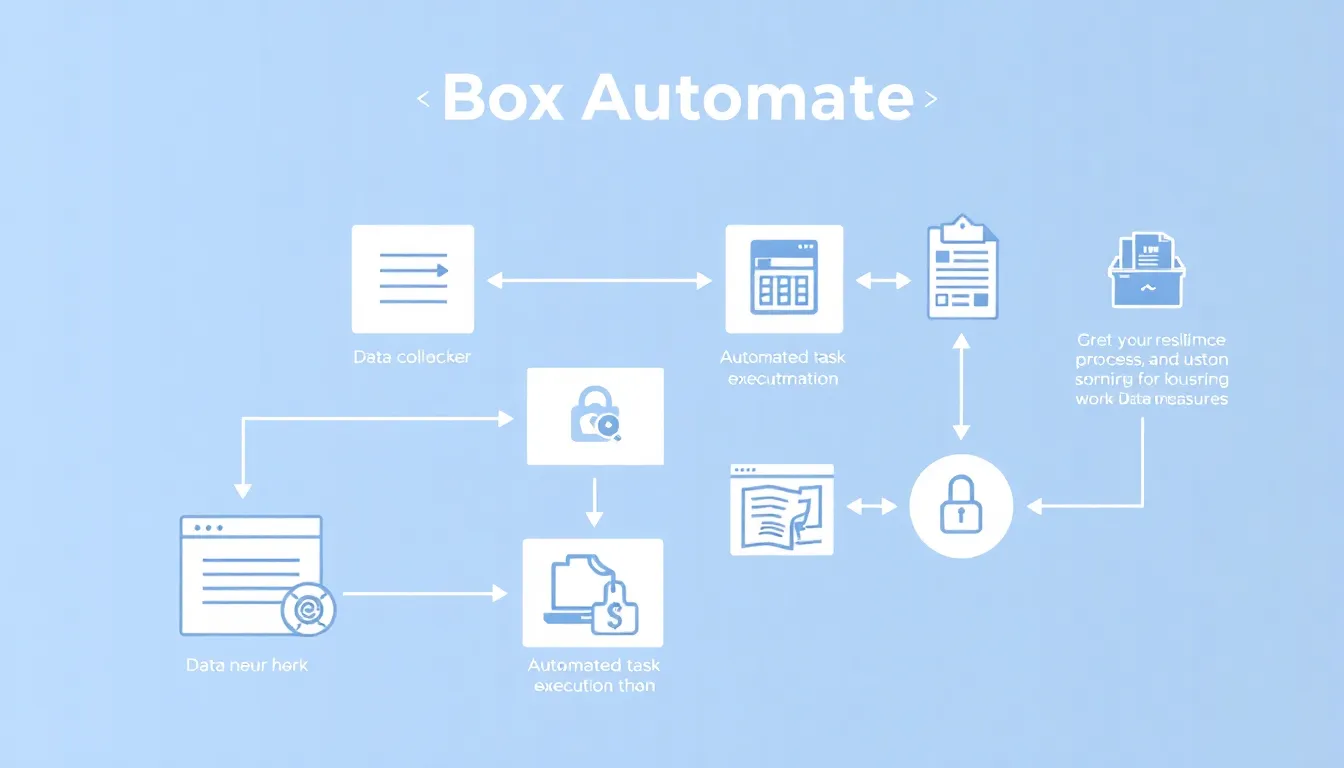In an era where data is the new currency, the significance of AI agents in automating enterprise business processes cannot be overstated. As organizations grapple with a deluge of unstructured data—from emails to documents and multimedia—the need for efficient, intelligent solutions provided by Box and tools like Box Automate is more pressing than ever.
Box’s CEO, Aaron Levie, encapsulates this transformative moment as we transition into the “era of context,” where AI tools are not just about executing tasks but understanding the subtleties of workflows. This paradigm shift empowers businesses to harness unstructured data effectively, streamline operations, and focus on strategic initiatives that drive innovation.
AI agents are evolving into essential partners that enhance productivity and create value by automating routine processes, ultimately enabling organizations to thrive in a fast-paced digital landscape.
“We’re in the era of context within AI,” states Aaron Levie, emphasizing the vital importance of understanding context for effective AI implementation. This perspective highlights the significance of context as organizations harness AI capabilities to streamline automation processes effectively.
User Adoption and Application of AI Tools in Enterprises
The adoption of AI tools, particularly for workflow automation, has soared in recent years, reflecting a significant shift in how businesses operate.
Adoption Rates:
As of 2025, approximately 78% of organizations have integrated AI into at least one business function, a substantial increase from 55% the previous year [Netguru]. This trend is driven by the rapidly growing demand for efficiency and productivity, wherein AI tools are increasingly being used across various sectors.
Applications:
AI’s impact varies across industries, with notable applications in finance, where 28% of CFOs utilize AI for automating forecasting, and an additional 39% planning to adopt similar technologies [Thunderbit]. In retail, companies have reported a 30% improvement in order processing efficiency post-automation [Gitnux]. Furthermore, coding tasks dominate, but sectors like education are catching up as AI applications expand.
Benefits:
The benefits of adopting AI for workflow automation are extensive. For small and medium enterprises (SMEs), a remarkable 35% increase in productivity has been recorded [Gitnux]. Moreover, daily AI users report notable enhancements in productivity (64%), focus (58%), and job satisfaction (81%) [TechRadar]. AI also aids in accelerating sales cycles, achieving a 30% faster turnaround [Gitnux].
User Data:
User engagement with AI tools, such as ChatGPT, is significant, with about 78% of knowledge workers employing these agents in everyday tasks. In the U.S., 28% of employed adults reported using ChatGPT for work purposes, doubling the 2023 rate [Azumo]. Despite this rapid adoption, concerns remain as nearly 48% of employees globally are hesitant to disclose their AI usage to management [Axios].
These statistics underscore the transformative effects of AI tools in enhancing automation across business processes, ultimately driving growth and operational efficiency.
Latest Trends in AI Automation: User Adoption and Industry Applications
The disruption ushered in by AI automation is reshaping how businesses operate, with transformative effects being observed across various industries. The trends indicate a palpable shift towards increased user adoption, backed by compelling statistics that demonstrate the growth and significance of AI tools in enterprise settings.
User Adoption Statistics:
A recent report reveals that an impressive 78% of organizations have embraced AI as part of their operations by 2025, significantly up from 55% the prior year [Netguru]. This jump illustrates the growing recognition among businesses of the need for efficiency and the capability of AI to fulfill that need. Notably, user engagement with AI tools is also taking center stage, with approximately 78% of knowledge workers utilizing AI agents like ChatGPT in their daily tasks. In the U.S., 28% of employed adults now report using ChatGPT for professional purposes—doubling the figures from 2023 [Azumo]. However, despite this rapid adoption, a considerable 48% of employees are hesitant to disclose their AI usage to management [Axios].
Applications across Industries:
The applications of AI tools extend into numerous sectors. In finance, 28% of CFOs currently automate forecasting through AI, while another 39% intend to adopt similar technologies soon [Thunderbit]. Retailers, harnessing AI for workflow automation, report a remarkable 30% uptick in order processing efficiency following AI integration [Gitnux]. Even in the education sector, where AI use is lesser-known, applications are steadily emerging as technologies evolve and penetrate traditional practices.
Benefits of AI Automation:
For small and medium enterprises (SMEs), integrating AI has led to a remarkable 35% boost in productivity [Gitnux]. Daily AI users marked a substantial enhancement in productivity (64%), focus (58%), and job satisfaction (81%)—testaments to the positive outcomes of adopting these innovative technologies [TechRadar]. Furthermore, the efficiency of sales cycles is also on the rise, with AI potentially accelerating turnarounds by as much as 30% [Gitnux].
In conclusion, the trends in AI automation reflect a clear movement towards increased user adoption and diversified applications across various industries, presenting businesses with opportunities to enhance their operational outcomes significantly. As organizations increasingly utilize AI tools, the prospect of a more productive and efficient workforce becomes more attainable, although concerns surrounding data usage and transparency still demand attention.
Box’s AI Offerings: Revolutionizing Workflow Automation
At the recent BoxWorks conference, Box unveiled an array of cutting-edge AI tools aimed at transforming how businesses manage their workflows. A significant highlight of these new offerings is Box Automate, a tool designed specifically for workflow automation, which enables organizations to streamline processes that traditionally involved unstructured data. Box’s CEO, Aaron Levie, has spotlighted the importance of these advancements, noting that AI technologies play a crucial role in managing the complexities of modern enterprise operations.
Understanding Box Automate
Box Automate represents a leap forward in automating workflows. This tool employs AI agents to simplify tasks that deal with unstructured data, a common challenge faced by many businesses. By integrating Box Automate into their operations, companies can ensure that these agents execute workflows consistently, with minimal variation each time a task is handled. This reliability allows organizations to build a robust system of automation where processes are harmonized across different departments.
The emphasis on unstructured data is particularly noteworthy. Many organizations struggle to extract valuable insights from this type of data, which can include emails, documents, images, and videos. Box Automate not only tackles this challenge by automating the workflows around unstructured data, but it also comes with built-in guardrails that enhance the security and governance of sensitive information when it’s processed.
Levie’s insight into the era of context emphasizes that every automated process needs to be rooted in understanding the tasks at hand. As AI tools like Box Automate evolve, they do so with a clear focus on contextual awareness—ensuring that the right permissions and data governance measures are in place to protect sensitive information.
The impact of these innovations is expected to be profound, providing businesses with the ability to increase efficiency and accuracy in their workflows. Ultimately, Box’s AI offerings signify a proactive step towards optimizing enterprise processes while addressing the nuances of handling unstructured data effectively. As AI continues to permeate business practices, tools like Box Automate will be pivotal in shaping a future where automation is seamless and deeply integrated into organizational operations.
In summary, Box’s advancements in AI and workflow automation represent a solid foundation for businesses looking to leverage technology in overcoming operational challenges, paving the way for greater productivity and strategic focus.
| Feature | Box | Competitors |
|---|---|---|
| Workflow Automation | Offers Box Automate for streamlined processes handling unstructured data. | Provides various tools, often requiring manual configurations. |
| AI Contextual Awareness | Emphasizes understanding the intricacies of tasks for optimal performance. | Varies by vendor; some may lack contextual features. |
| Data Security | Built-in guardrails for secure processing of sensitive information. | Security measures depend on solution and may vary greatly. |
| Usability | Designed for ease of integration with existing workflows. | May prohibit ease of use without customization and training. |
| Customization | Allows settings adjustments, automated without complex setups. | Often requires manual intervention for customization. |
| Support for Unstructured Data | Specializes in automating workflows involving diverse data types. | Some tools may not support unstructured data as effectively. |
| Feature | Box | Competitors |
|---|---|---|
| Workflow Automation | Offers Box Automate for streamlined processes handling unstructured data. | Provides various tools, often requiring manual configurations. |
| AI Contextual Awareness | Emphasizes understanding the intricacies of tasks for optimal performance. | Varies by vendor; some may lack contextual features. |
| Data Security | Built-in guardrails for secure processing of sensitive information. | Security measures depend on solution and may vary greatly. |
| Usability | Designed for ease of integration with existing workflows. | May prohibit ease of use without customization and training. |
| Customization | Allows settings adjustments, automated without complex setups. | Often requires manual intervention for customization. |
| Support for Unstructured Data | Specializes in automating workflows involving diverse data types. | Some tools may not support unstructured data as effectively. |
Data Security Concerns in AI Automation
As AI automation becomes integral to business processes, data security concerns remain at the forefront of discussions surrounding this technology. While AI has the potential to optimize workflows, there is a palpable apprehension regarding the management of sensitive data within automated systems. As noted by a prominent voice in the industry, “There’s a real fear that sensitive data will get regurgitated or misused.” This sentiment resonates deeply, particularly in sectors handling personal information or proprietary business data.
The automation of workflows often involves accessing vast amounts of unstructured data, which can include documents, emails, and multimedia. This creates unique challenges for organizations striving to protect valuable information. Risks include not only the potential for data leakage but also the uncertainty over how AI models process and store information. If not properly managed, these vulnerabilities could lead to breaches that compromise data integrity and trust.
Despite these limitations, it is essential to maintain an optimistic outlook on AI automation and its capacity to improve data security frameworks. Many organizations are proactively implementing sophisticated data governance protocols and security measures designed to mitigate risks associated with AI use. For instance, tools like Box Automate incorporate built-in guardrails that help ensure sensitive information is processed securely, thus respecting privacy rights and data regulations.
In addition, the rise of contextual awareness in AI applications fosters a tailored approach to data handling, providing solutions that are increasingly aware of the nuances of data privacy. By leveraging machine learning models trained on secure protocols, organizations can enhance their ability to detect anomalies, provide audits, and improve compliance with data protection regulations.
In conclusion, while data security concerns in AI automation are valid and should not be dismissed, the advancements in technology and security measures offer promising pathways to protect sensitive information. By combining innovation with robust governance, businesses can harness the full potential of AI while safeguarding the data that fuels their operations, paving the way for a more secure and efficient future.
Data Security Concerns in AI Automation
As AI automation becomes integral to business processes, data security concerns remain at the forefront of discussions surrounding this technology. While AI has the potential to optimize workflows, there is a palpable apprehension regarding the management of sensitive data within automated systems. As noted by a prominent voice in the industry, “There’s a real fear that sensitive data will get regurgitated or misused.” This sentiment resonates deeply, particularly in sectors handling personal information or proprietary business data.
The automation of workflows often involves accessing vast amounts of unstructured data, which can include documents, emails, and multimedia. This creates unique challenges for organizations striving to protect valuable information. Risks include not only the potential for data leakage but also the uncertainty over how AI models process and store information. If not properly managed, these vulnerabilities could lead to breaches that compromise data integrity and trust.
Despite these limitations, it is essential to maintain an optimistic outlook on AI automation and its capacity to improve data security frameworks. Many organizations are proactively implementing sophisticated data governance protocols and security measures designed to mitigate risks associated with AI use. For instance, tools like Box Automate incorporate built-in guardrails that help ensure sensitive information is processed securely, thus respecting privacy rights and data regulations.
In addition, the rise of contextual awareness in AI applications fosters a tailored approach to data handling, providing solutions that are increasingly aware of the nuances of data privacy. By leveraging machine learning models trained on secure protocols, organizations can enhance their ability to detect anomalies, provide audits, and improve compliance with data protection regulations.
In conclusion, while data security concerns in AI automation are valid and should not be dismissed, the advancements in technology and security measures offer promising pathways to protect sensitive information. By combining innovation with robust governance, businesses can harness the full potential of AI while safeguarding the data that fuels their operations, paving the way for a more secure and efficient future.



In conclusion, the integration of AI in workflow automation marks a transformative chapter for businesses. The significant advancements in AI technology enable companies to harness unstructured data effectively, fostering enhanced efficiency and productivity across operations.
Organizations that adopt AI tools like Box Automate witness tangible benefits, including streamlined workflows, increased accuracy, and faster decision-making processes. Moreover, the emphasis on data security and governance is paramount as businesses navigate the complexities introduced by automation.
As noted by industry leaders, ensuring that sensitive information is handled responsibly and securely is essential to building trust and compliance in an increasingly automated landscape. Ultimately, by embracing the capabilities of AI while implementing robust security measures, businesses position themselves to thrive in a rapidly changing digital world.

